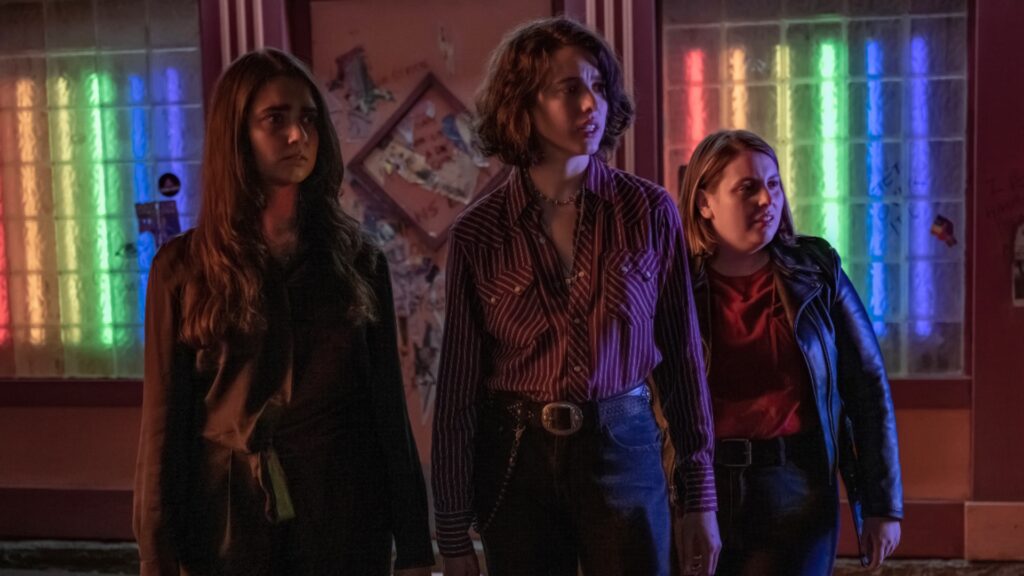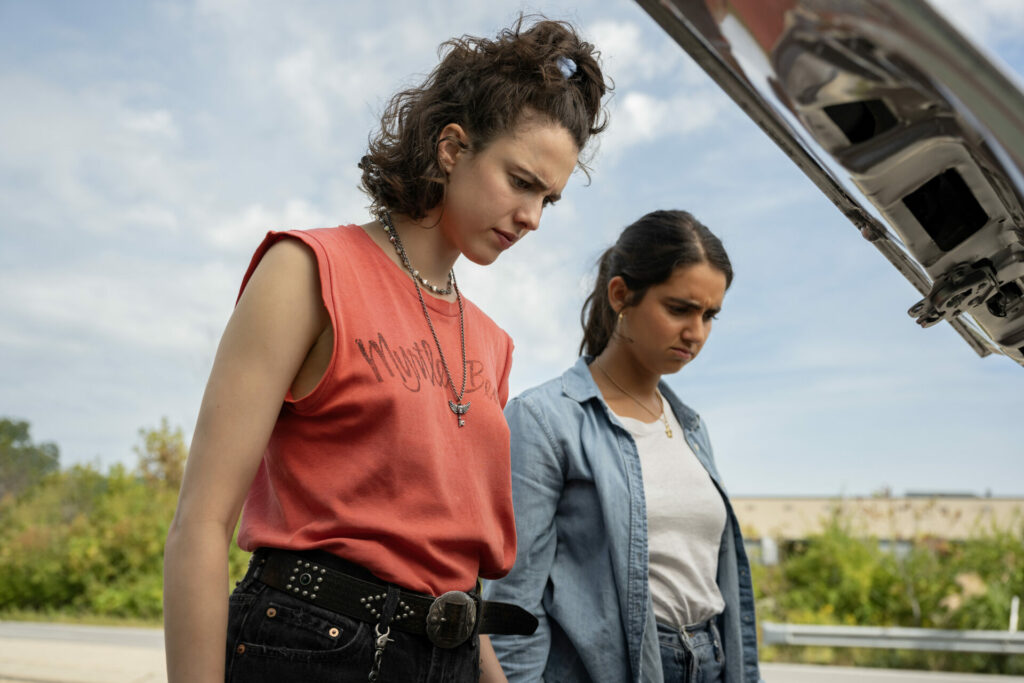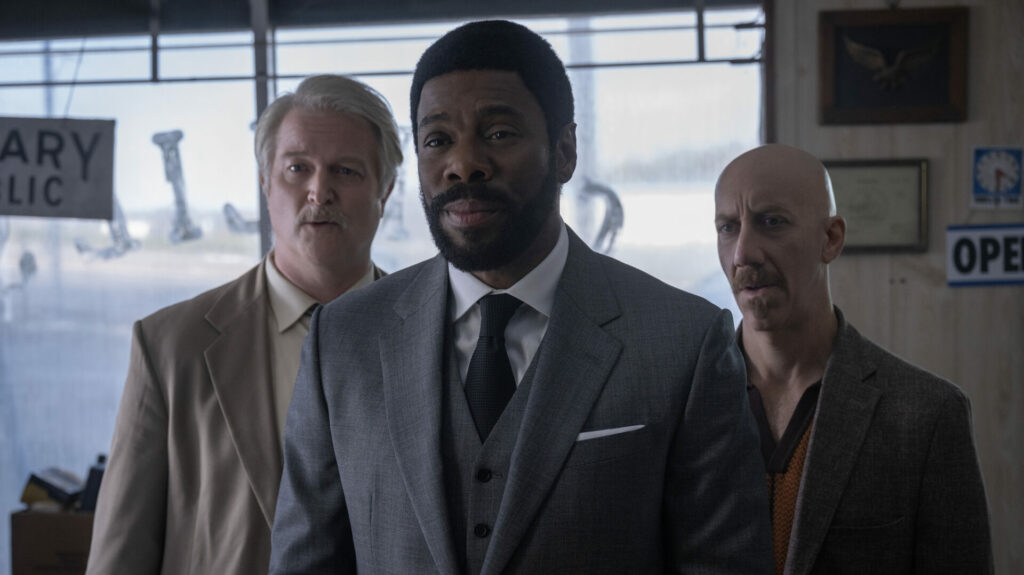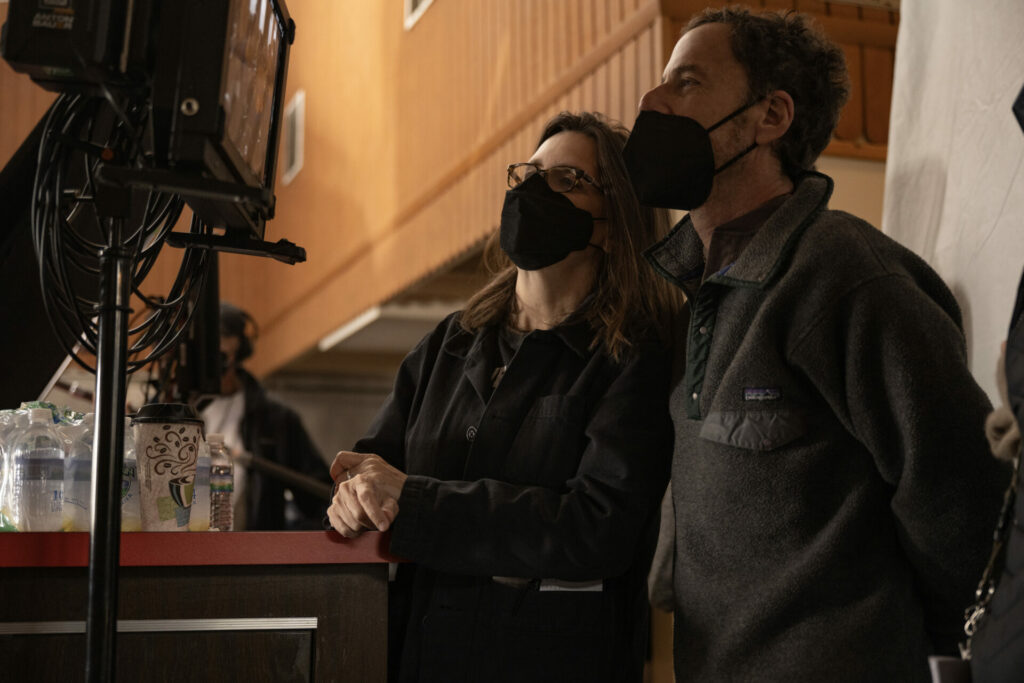Drive-Away Dolls’ Margaret Qualley, Geraldine Viswanathan, Ethan Coen and Tricia Cooke on ‘happy queer cinema’
Exclusive: "It presents a whole spectrum of female sexuality that isn't often in the media," says Qualley of the groundbreaking comedy caper
By Simon Button

Having two queer women at the centre of a deliberately daft road movie like Drive-Away Dolls seems groundbreaking even in 2024. “But the whole thing feels kind of groundbreaking to me,” says Margaret Qualley, who co-stars with Geraldine Viswanathan in the B-movie homage from the husband and wife team of director Ethan Coen (working without his brother Joel for a change) and Tricia Cooke (as co-writer). “To read the script and have every good part be a girl part, to have all the best parts be women…”
Geraldine finishes the sentence for her. “It’s kind of inadvertently radical in that sense. It felt so lighthearted and silly and just like such a fun story where the characters just happen to be gay. It gives me hope that we’re at this place now where we can say ‘Here are women, here are gay women and they’re being outrageous and ridiculous’ where it’s not that deep and it’s getting the same treatment as the majority of characters that have been represented on screen for the rest of time until now.”
Qualley, whose previous credits include Once Upon a Time in Hollywood and Poor Things, headlines as free-spirited Jamie, who in 1999 has broken up with yet another girlfriend and has been booted out of the apartment they shared. Seeking a new start on the cusp of a new millennium, she persuades her shyer and more unassuming friend Marian (Viswanathan from Bad Education) to accompany her on a road trip from Philadelphia to Tallahassee.
The plan is to drop off a ‘drive-away’ car but little do they know that they’re carrying a cargo belonging to a bunch of criminals. The bad guys are on their tail as the girls embark on a journey filled with casual sex and a sexual awakening for Marian, not to mention danger and dildos.

At the heart of the crazy caper are two vivid, far-from-stereotypical queer characters. As Qualley says of Jamie: “She’s a hound dog and a renegade who has the good fortune of getting to know Marian, who is wise beyond her years and really makes Jamie question everything.” And Viswanathan says of Marian: “She is demure and introverted, and she has a very big, bruised heart and is protecting that. She’s stuck in her life and she just needs to shake some things loose. And lo and behold, Jamie comes to the rescue.”
Speaking to Attitude via Zoom, the duo admit they didn’t do much research into what life was like for lesbians 25 years ago because it was all there in Joel and Tricia’s script. “But we were shooting in these really iconic, legendary gay bars and real establishments,” Margaret adds, “and you could feel the history in those places.”
Tricia identifies as queer and has spoken before about being in a non-traditional marriage where she and Ethan both have other partners. “So her perspective and experience were instrumental for the movie and for our way into understanding it,” says Geraldine of a script that features autobiographical elements of Tricia’s own life.
It also features intimate scenes for the two leads, who found the way they were written and filmed to be refreshing. “I’ve said this before,” Margaret elaborates, “but I think as a woman a lot of times when you’re doing sex scenes the goal basically is to look hot, you know? And that is not the goal in these sex scenes at all. It’s a totally different beast, to be honest, and way more fun. When the goal in a sex scene is for it to be funny, you’re having a ball. It’s like ‘Today we’re going for embarrassing with a hint of mortifying on the side’.”
Geraldine laughs. “It’s so intimate but also embarrassing, but then so is acting and so is comedy. That makes the pivotal moment for Marian extra tender, delicate and sweet because all the other sex scenes are so rowdy and sweaty and in-your-face.”
Viswanathan has thoughts about the ongoing debate as to whether or not only openly queer actors should play queer roles. “I think it comes down to opportunities. I do think that there should be equal opportunities for everyone but at the same time we’re actors and sexuality is such an internal, personal, private thing. And it’s a spectrum, it’s a journey and it’s not visual. So I think if you’re right for the part and you approach it with respect and sensitivity and tenderness, then that can only be good.”

The film was originally called Drive-Away Dykes, which might have posed a problem in more conservative parts of the States. “We just want as many people as possible to see the film,” Geraldine says of the name change. “Maybe kind of signalling that from the outset might deter some people and we’d love to kind of just get them in the theatre and have them have a great time.”
Is there a serious message amidst all the mayhem? Geraldine laughs again. “Get laid if you can!” Margaret nods in agreement. “Yeah, get laid! I don’t know if it’s saying anything serious but I like the idea of young women seeing this movie because I think that it presents a whole spectrum of female sexuality that isn’t often in the media and that is, like, silly and goofy and adventurous and not shameful.” Geraldine takes up the thread: “Any taboo around sexuality or sex, this film kind of explodes them all. I think that that’s a small act of defiance.”
They have a great on-screen rapport and when they chat via Zoom it’s like a love-in. “I fell in love with Geraldine from the moment I met her,” Qualley practically coos. “It was love at first sight. Getting to know her was a dream.”
Viswanathan grins. “It really just worked out. The casting gods shone down on us.” Qualley returns the grin as she adds: “We passed many an hour sitting beside each other on our little chairs, chit-chatting, rolling around, lying on the floor, making snacks. And it was so fun to film.”
Also in the mix is Miley Cyrus, cameoing in a role that we’ve been asked not to go into detail about because it’s key to one of the many plot twists. She wasn’t on set for long but Geraldine got to meet her. “For about five seconds and then my body sort of broke down because she’s my ultimate inspiration, has been for my whole life and continues to be. She was just the most unearthly, beautiful goddess. Meeting her was really just the cherry on top of the surreal dream that it is to be a part of this movie.”
Margaret, meanwhile, fangirled over Coen and Cooke. “It’s my understanding that Ethan made this movie with and for Trisha. It was partly her story and they’ve been working together forever and they’re partners. I think they loved working together and I loved working with them together. When people love working with each other it’s really nice to be around.”
On a separate Zoom call, the couple say they were inspired by B-movies by the likes of Russ Meyer and John Waters as well as trashy noir films, westerns and the blaxploitation genre. “They all have a kind of freedom,” Joel explains, “and a slapdash quality that’s kind of fun and refreshing. They just go, if you know what I mean? They’re propulsive.”
Tricia based the character of Jamie on a close friend who was “balls to the wall, a free spirit”. She and Ethan then came up with the more demure Marian as a dramatic contrast. “We wanted to come up with a character who was the yin to that yang. Ethan will say that the repressed Marian is based on him but I’m not sure if that’s true. But we just wanted to create two interesting, strong female characters, and the embracing of this sexual world was really important to us – to be able to put lesbians having sex on screen that was kind of fun and free.”

It’s a happy queer movie and the filmmakers concur that there’s a gap in the market for such things, although Tricia is happy to note: “There are more and more, which is great. I relish happy queer cinema. We’re a marginalised community, so it’s really important that we get as many stories out there as we can. But certainly when we were writing it back in the early 2000s it felt like it would fill a gap because most of the lesbian stories were tragic, didn’t have happy endings and weren’t light-hearted, which this is meant to be. And also they weren’t as juvenile. They weren’t silly.” Ethan nods and adds: “There is an underserved audience for stupid gay movies.”
They’re tight-lipped about Miley’s character in the movie and when asked why she came on board Joel deadpans: “That’s hard to do without giving anything away because it’s so connected to Miley’s interest in penises.”
Tricia laughs loudly. “Which we didn’t know about. We weren’t aware that she had a room dedicated to dildos and phalluses, but we were big fans of her work as an actress and as a musician. And I knew that she had an LGBT+ charity that helps unhoused people, so I thought that she would be receptive.”
They sent Miley the script and were surprised to learn about her fascination with sex toys. As Ethan recalls: “She said ‘Didn’t you know about the dildo room in my house? It was profiled in Town & Country magazine’. Who knew? We didn’t!”
Drive-Away Dolls is in cinemas from 15 March.
